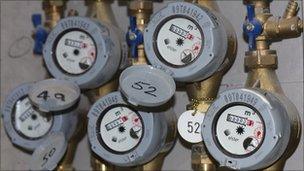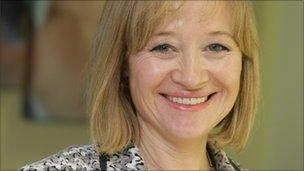Water bills: how you can cut them
- Published

About 30% of households in England and Wales now use water meters
At the end of February the water regulator, Ofwat, announced that water bills were to go up in line with inflation, leading to price increases that may have surprised some customers.
In 2009, the regulator announced that average water bills would remain broadly flat in real terms until 2015.
But now, the impact of an inflation rate of almost 5% means many water customers will be paying more than they thought.
Water and sewerage companies have delivered an investment programme of around £90 billion since privatisation in 1989.
This has greatly improved the water network and the wider water environment but has ultimately been paid for by customers.
As a result, average water and sewerage bills are now around 44% higher in real terms than they were in 1989.
From our research we know that satisfaction with overall service in water is 93%, but satisfaction with value for money is lower at 70%.
While water customers are concerned about the value for money of their service, there are measures they can take to save money.
Meters
Although customers have been able to have a water meter installed free of charge for over 10 years, many of those who would make significant saving with a meter have not made the switch.
You may be better off on a meter if you live alone or use relatively small amounts of water, particularly if your property has a high rateable value.
The Consumer Council for Water's website, external includes a handy water meter calculator to help customers work out if they could save money by having a water meter fitted, which in some cases can be as much as £100.
Generally, customers can switch back to the unmetered charge anytime within the first 12 months if they are unhappy with the change.
If a water meter cannot be fitted, customers will have the option of an 'assessed measured charge' which reflects what a likely metered bill would be.
However, for larger families in lower value homes, a meter may mean they end up paying more.
Tariffs
By carefully reading through their water bill, customers may find ways to save.

You may be paying unnecessary charges, warns Yve Buckland
For example, if they have a soakaway which drains rainwater into the ground rather than into the public sewerage system, they can apply to their local sewerage company to have surface water drainage charges removed.
This could typically save around £30 each year.
If customers have a septic tank they should not be paying sewerage charges at all.
There are special tariffs and assistance schemes available to help customers who are struggling to pay their bills.
Our advice would be for customers to contact their water company to see what help they are eligible for.
WaterSure
WaterSure is a scheme, available via all water companies in England and Wales, that caps a household's charges at the average metered bill for their area.
It means vulnerable households can use the water they need without having to worry about a high bill.
Customers receiving income related benefits, who have a meter and either three or more dependant children, or a medical condition that means they need to use more water, are eligible for help under the WaterSure scheme.
A low income household of five with a water meter could be spending around £700 per year on water.
By applying for the WaterSure scheme they might be able to cut this bill in half.
We believe that customers should not pay any more than they need to for their water or sewerage services.
By taking a few minutes to consider our money saving tips and to check their bills, customers can avoid losing out, and in some cases could make real savings.
The opinions expressed are those of the author and are not held by the BBC unless specifically stated. The material is for general information only and does not constitute investment, tax, legal or other form of advice. You should not rely on this information to make (or refrain from making) any decisions. Links to external sites are for information only and do not constitute endorsement. Always obtain independent, professional advice for your own particular situation.
- Published25 February 2011
- Published9 November 2010